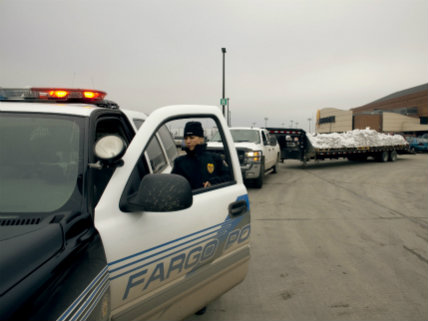North Dakota Senate Says It's Fine for Police to Seize Property Without a Conviction
Meanwhile, new reforms in Minnesota improve on a 2014 law requiring criminal conviction before property can be forfeited to law enforcement

Two states in the upper Midwest this week considered making changes to state laws allowing police to seize property from innocent people suspected of committing a crime. Only one succeeded in protecting property rights.
State lawmakers in North Dakota killed a proposal that would have required law enforcement to get a criminal conviction before seizing property though civil asset forfeiture proceedings. Meanwhile, in neighboring Minnesota, a state that already requires a criminal conviction before asset forfeiture can occur, state lawmakers passed and Gov. Mark Dayton signed a bill to strengthen that 2014 law by making it harder for cops to seize jointly owned property after a DUI conviction.
Both bills demonstrate the ongoing fight between law enforcement special interests, which argue civil forfeiture is necessary to stop criminal behavior (and often benefit from the process by using seized assets to pad their department budgets), and reformers who see forfeiture as a fundamentally un-just process that victimizes innocent property owners.
In North Dakota, it seems the police have the upper hand. According to the Institute for Justice, a libertarian law firm, North Dakota has some of the worst asset forfeiture laws in the country, and that won't be changing after the state Senate unanimously voted down a bill to require a criminal conviction before prosecutors could seize property or money involved in the crime. The bill had passed the state House in February with a 50-42 vote despite opposition from law enforcement groups.
In addition to requiring a conviction before state and local police could engage in forfeiture, the bill would have prohibited police departments from passing forfeiture cases off to federal law enforcement authorities, a practice known as "equitable sharing" that is sometimes used to get around state-level restrictions on forfeiture.
Unlike North Dakota, Minnesota has some of the nation's best asset forfeiture laws. A 2014 law made Minnesota the second state in the nation to require a criminal conviction before forfeiture could occur, and Gov. Mark Dayton added to those protections for property owners this week by signing a bill to prohibit the forfeiture of jointly owned property, like cars, in the aftermath of a DUI arrest, Minnesota Public Radio reports.
The bill was prompted, in part, by a lawsuit challenging the seizure of a car by police in Isanti County, Minnesota. The car was jointly owned by a husband and wife, but was seized by police following the wife's 2006 arrest for DUI. The husband, David Laase, argued that he was innocent and that he should not lose possession of the car because of his wife's crime. The state Supreme Court ultimately upheld the forfeiture.
"This reform will open the courthouse doors to wives, parents and other innocent owner claimants and overturn a troubling ruling by the Minnesota Supreme Court," said Lee McGrath, managing attorney of the Institute for Justice's Minnesota office, in a statement.
With the new reforms signed into law this week, Minnesota continues to be a national leader in restricting the abusive practice of asset forfeiture. On the western banks of the Red River, though, property rights remain significantly less secure.


Show Comments (8)